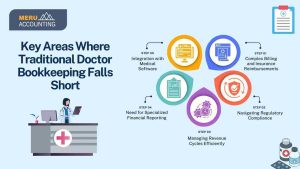Where Traditional Bookkeeping Falls Short for Doctors
Bookkeeping for doctors is about keeping track of the money flowing in and out of a medical practice. Unlike traditional doctor bookkeeping, financial management for doctors comes with its own set of challenges and regulations that require special attention. Standard bookkeeping just doesn’t cut it because of the unique demands in the healthcare industry.
To overcome these challenges, many medical practices select doctor bookkeeping, tailored specifically to healthcare. These systems present features of automated billing, compliance tracking, and seamless integration with medical software. This ensures the practice stays financially healthy and allows doctors to focus more on patient care.
Key Areas Where Traditional Doctor Bookkeeping Falls Short

- Complex Billing and Insurance Reimbursements: Billing in the healthcare industry is far from straightforward. Medical practices must manage a wide range of tasks, from processing insurance claims to tracking patient payments and handling adjustments. Each insurance company has its own set of rules, which adds to the complexity. Traditional doctor bookkeeping, designed for simpler transactions, often can’t manage the detailed tracking required for these processes. As a result, practices may experience errors in billing, delays in reimbursements, and even financial losses due to uncollected payments.
- Navigating Regulatory Compliance: One of the industries with the highest levels of regulation is healthcare, which has strict guidelines for compliance and financial reporting. Precise documentation and reporting are necessary to comply with financial transparency regulations such as HIPAA. Traditional bookkeeping for doctors works fine in less regulated industries but lacks the features needed to meet these strict standards. A mistake in financial reporting can lead to audits, penalties, or worse, putting the practice at risk.
- Managing Revenue Cycles Efficiently: For a medical practice to have a stable cash flow, revenue cycle management is crucial. This entails managing accounts receivable, collecting payments, addressing claims, and supervising the process from patient intake to the last payment. Traditional bookkeeping methods are often too basic to handle the complexities involved, leading to inefficiencies such as delayed payments and increased accounts receivable. These delays can cause significant financial strain on the practice, making it harder to cover operational costs and invest in growth.
- Need for Specialized Financial Reporting: Medical practices need detailed financial reports beyond the basics to offer insights into specific areas for doctor bookkeeping. For example, doctors may want to examine the profitability of certain treatments or understand the cost-effectiveness of different services. Traditional bookkeeping systems often can’t generate detailed, modified reports. Without these insights, it’s challenging for practices to make informed decisions that could improve profitability and operational efficiency.
- Integration with Medical Software: Modern medical practices rely on various types of software to manage patient records, appointments, billing, and more. Systems for electronic health records (EHRs) are essential to daily operations. However, traditional bookkeeping systems often don’t integrate well with these platforms. This lack of integration can lead to inefficiencies, as staff may need to manually enter data into multiple systems, increasing the risk of errors and wasting valuable time. In contrast, specialized bookkeeping for doctors designed for healthcare can seamlessly integrate with existing medical software, ensuring that data flows smoothly between systems and reducing the administrative burden on staff.
Conclusion
Given the unique financial challenges of running a medical practice, traditional bookkeeping methods are not anymore. The complexities of billing, the strict demands of regulatory compliance, the necessity of efficient revenue cycle management, and the need for specialized financial reporting all highlight the importance of having a robust system in place. Meru Accounting provides customized services to address these challenges. With our experts in bookkeeping solutions, tailored specifically for the healthcare industry, we offer seamless integration with medical software, automated processes, and compliance tracking. By choosing Meru Accounting, your practice can focus on delivering excellent patient care, while we take care of your financial health.
FAQs
- Why is traditional bookkeeping not suited for doctors?
Traditional bookkeeping does not support the detailed needs of medical billing, insurance tracking, and compliance. Doctors need systems built for healthcare tasks, not basic business records. - What makes medical billing more complex than other industries?
Doctors must manage patient charges, insurance claims, billing codes, and payment updates. Traditional tools are too simple to track these steps without mistakes or delays. - How does compliance affect bookkeeping in a medical practice?
Medical bookkeeping must follow strict rules like HIPAA. Standard systems do not offer secure records or proper reports, which puts the practice at risk of fines or audits. - What is revenue cycle management in doctor bookkeeping?
It tracks every step from a patient visit to final payment. This includes billing, claims, and collections. Traditional methods can’t manage these steps without slowing down cash flow. - Why do doctors need custom financial reports?
Doctors often want to compare treatment costs or review profits by service. General reports do not show these details, which limits planning and reduces control over spending. - Can standard bookkeeping connect with medical software?
Most do not. Doctors use EHR and billing systems that need smooth data flow. Without this, staff must enter data twice, which causes mistakes and wastes time. - What risks come with using standard bookkeeping in healthcare?
Doctors face billing delays, unpaid claims, and reporting errors. These problems reduce income, add stress to staff, and may hurt the quality of patient care. - How does doctor-specific bookkeeping improve financial health?
It connects with practice software, tracks rules, and manages billing in less time. This helps doctors stay focused on patient care while keeping payments steady.


